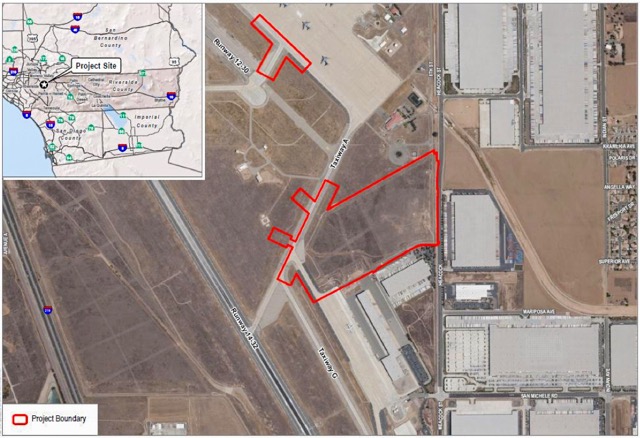Jet Port
By PAUL J. YOUNG
City News Service
RIVERSIDE (CNS) – A proposed 34-acre development on March Air Reserve Base that would significantly expand civilian flight operations is meeting opposition from area residents concerned about rising levels of noise and pollution, while one of the firms backing the venture argues it’s compatible with the base’s purposes.
The Meridian Gateway Aviation Center Project has been in the planning stages for four years, but its ramifications became the center of controversy with the release in May of a draft environmental impact report that profiled all aspects of the project.
“We believe the impacts will be negative,” Catherine Fischer of Murrieta told City News Service. “We want to keep this area nice. But the Inland Empire already has some of the worst air pollution in the country. The sky is supposed to be blue, not dark brown. With Gateway, we’ll have not only more airplanes emitting pollution, but all the diesel trucks. It’s so damaging to our health, especially our children’s.”
Fischer’s group, Community Alliance for Riverside’s Economy & Environment, CAREE, has been sounding the alarm on Gateway’s potential downsides, mailing thousands of “Save March” circulars, asking residents to contact the March Joint Powers Authority Commission to express their concerns.
The group cited many of the points contained in the draft EIR, a nearly 700-page document that generated more than 200 comments.
One of the EIR’s highlights was the “significant and unavoidable” finding tied to aircraft noise. Under the current operations model, Gateway would lead to 128 additional two-way flights every month, and during the Holiday Season, that would increase to 256 flights. The total number comes to over 10,000 more arrivals and departures annually, all involving cargo aircraft at the March Inland Port Airport, the section of the base dedicated to civilian functions.
Riverside-based environmental consulting firm Dudek, which prepared the EIR, noted the traditionally accepted baseline noise levels tied to commercial operations is 65 decibels during the day and 60 at night. If Gateway goes live, some residential areas near March could experience peak noise levels closer to 70, the study found.
The EIR also pointed to inevitable increases in pollutants, acknowledging the “project would exceed operational regional thresholds of significance for volatile organic compounds, oxides of nitrogen and carbon monoxide emissions.”
The project site is within a tract designated by the U.S. Environmental Protection Agency in 1991 as a priority for Superfund Program rehabilitation due to the “use, storage and disposal of hazardous materials and waste.”
The area immediately surrounding the base has been ranked between 78 and 98 on the CalEnviroScreen tabulator that identifies pollutant impacts to disadvantaged communities. It’s an inverse scoring method, so a higher score — one over 50 — reflects “a higher pollution burden,” according to the California Environmental Protection Agency.
The EIR said greater emissions would be inevitable with more aircraft and more trucks in and out of the docking bays of the proposed 180,000-square- foot warehouse where the planes would be delivering and retrieving loads.
“There’s the airplane noise, traffic and the pollution that, overall, would be degrading to our quality of life here,” said Chris Bardeen, a chemistry professor at UC Riverside who has lived in the Mission Grove area of the city, beneath March’s flight paths, for 20 years. “There’s a bigger effect on health. What sticks in my craw is these guys could come in and ignore the community’s concerns, do a poor job on the EIR and still probably get everything they want. Once they build this, we’d have no power whatsoever.”
The CAREE activists challenged cargo hauler DHL when it was utilizing March as a west coast hub in the 2000s. Aircraft noise at all hours was a major complaint, brought before the Riverside County Board of Supervisors. DHL pulled up stakes during the Great Recession. Amazon is now a major user of the March Inland Port Airport.
“If the residents surrounding March are going to be subjected to more aircraft noise, I’d prefer to have that noise from military aircraft, performing national security operations,” Supervisor Kevin Jeffries, who sits on the March JPA Commission, told CNS. “Developing vacant land on the base, adjacent to the military runway, for the purpose of private sector cargo flights would seem only to complicate future military flight operations.”
Jeffries’ fellow supervisor and JPA Commission member Yxstian Gutierrez did not respond to requests for comment, nor did any of the council members from Moreno Valley and Perris. Riverside City Councilman Jim Perry told CNS his staff “is still in the process” of analyzing the EIR.
Fischer and Bardeen said there’s a nexus between Gateway and a nearby industrial park development, the 800-acre West Campus Upper Plateau, which is proposed in JPA-controlled space west of Interstate 215. Elements of the same consortium are spearheading both projects.
“Warehouses near an air cargo port generate more income,” Fischer said.
One of the co-developers of the projects, Upland-based Lewis Group, said they’re “completely independent” of one another.
“We are very supportive of the (Gateway) project,” Lewis Group Vice President Randall Lewis told CNS. “Gateway is consistent with the goals of the March JPA General Plan. It supports March ARB through infrastructure enhancements. The proposed flight operations comply with the existing joint-use agreement. The benefits that Gateway will provide will (improve) the region for many years to come.”
March JPA CEO Grace Martin said Gateway, as with all projects proposed to the JPA, is undergoing a thorough “vetting process.” The final EIR, due out next year, will be left to the JPA Commission to consider, and based on that, make modifications to the plans or reject them altogether.

For More Visit www.zapinin.com.

